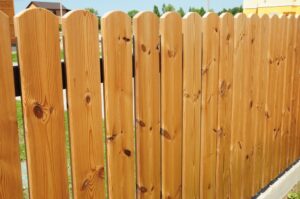Don’t Let the Summer Sunshine Affect Your Fence
Summer sunshine brightens up our lives, but it can have quite the opposite effect on our fences and other outdoor structures. In fact, sunlight does more damage to more materials than any other natural element, including wood, vinyl, and even some types of metal.
How Sunshine Affects Fences
Any adverse effects on fencing will be determined largely by the materials used, as well as the finish provided.
Wooden Fences

Wood that isn’t painted or sealed quickly turns a natural gray color as UV radiation oxidizes the cellulose. Many people find the look attractive while much more go to lengths to avoid it. Generally, tropical hardwoods like cedar weather best and can be safely left uncoated, for a while anyway. The problem is that wood that is constantly exposed to the sun will gradually degrade over time. So it’s not just a question of aesthetics. Eventually, the cellulose will break down, negatively impacting on the structural integrity of the structure.
Water can also affect wood, either when it rains or when you spray plants with water. If left to dry in the sun it can become blotchy. If it remains wet it could rot.
Generally, paint, solid stains, and colored sealants (particularly polyurethane) all block UV light. Even if these products eventually start to peel off the wood will often appear light and bright. This can be a catch 22 if you want the natural grain of the wood to show through a sealed finish. But even transparent sealants and decking oil will help to protect the surface.
Since fences are by their very nature exposed to the sun in summer it’s important to pay attention to maintenance. If the wood or wood finish appears dark when it gets wet, this means the water is being absorbed. This might be because the coating applied has cracked or worn down, but tiny cracks in the surface of the wood will also lead to absorption of water. If the color of the wood and/or finish fades, this is another indication that the sun has had an effect. The answer is to reseal or repaint as soon as possible.
Vinyl Fences
Vinyl fencing is made from polyvinyl chloride (PVC) with various additives designed to make the material as resistant to weather as possible and to slow the harmful effects of the sun’s harmful UV rays. For instance, many manufacturers add titanium dioxide that inhibits UV and prevents the vinyl from yellowing or from any other form of discoloration. Vinyl may though become discolored as a result of grime and mold so it must be kept clean through all the seasons, including summer.
One of the major issues with vinyl fences is the glare they produce from the sun. Ironically, from this point of view, it helps when the sun has reduced its sheen.
Metal Fences
There are many different types of metal fences including aluminum, and mild steel, some of which are more decorative than others Generally, all metal surfaces should be kept clean and if painted, repainted regularly. The sun does tend to fade the color of aluminum unless it has been coated for protection.
So whatever type of fencing you have in or around your yard, keep it clean, and if the sun is causing its deterioration do something about it as soon as possible!
If you are looking at getting a new fence installed or have would like to learn more about fence restoration, call FenceWorks of Georgia for an estimate!

